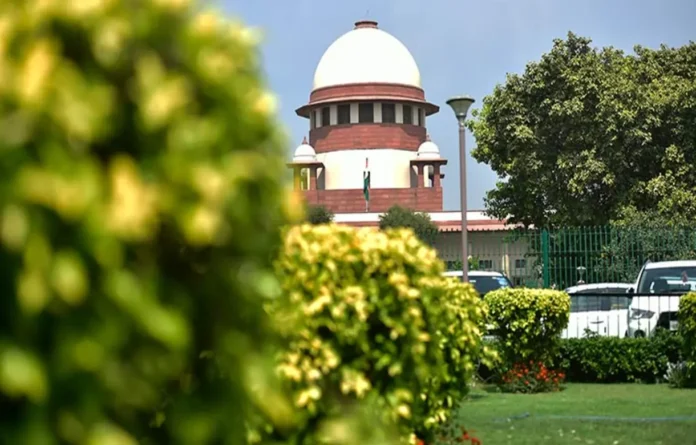The Supreme Court on Tuesday directed the Central government and all state governments across the country to file their respective responses on the reference made by President Droupadi Murmu regarding the powers granted to the Governor and the President under Article 200 and 201 of the Constitution on assent of state Bills.
The Constitution Bench of Chief Justice of India BR Gavai, Justice Surya Kant, Justice Vikram Nath, Justice PS Narasimha and Justice AS Chandurkar listed the matter on July 29 for the appearances of the respondents.
While expressing it’s intention to hear the matter in August, the Apex Court sought assistance of Attorney General R Venkataramani in the case.
Solicitor General Tushar Mehta said he would appear for the Central government.
Appearing for the Kerala government, Senior Advocate KK Venugopal said the state would raise an issue regarding the maintainability of the Reference.
Representing the State of Tamil Nadu, Senior Advocate P Wilson said the issues in the Reference were already covered by the judgment in the Tamil Nadu Governor’s case. He added that the Tamil Nadu government would also be raising the issue of maintainability.
On May 13, 2025, President Murmu invoked the Supreme Court’s advisory jurisdiction under Article 143 of the Constitution. The provision empowered the President to seek the opinion of top court of the country on questions of law or facts of public importance. She posed 14 questions over the Apex Court verdict of April 2025, which set timelines for a state Governor and the President to grant assent to state bills under Articles 200 and 201 of the Constitution.
The President asked whether the Court could judicially prescribe a timeline for the exercise of constitutional powers by the President and the Governor.
She sought to know about the constitutional options available before a Governor when a Bill was presented to him under Article 200 of the Constitution, including whether the Governor was bound by the aid and advice tendered by the Council of Ministers in the matter.
President Murmu further wanted to know whether the exercise of constitutional discretion by the Governor under Article 200 of the Constitution justiciable.
She sought answer to whether Article 361 of the Constitution was an absolute bar to the judicial review in relation to the actions of a Governor under Article 200 of the Constitution.
The President said in the absence of a constitutionally prescribed time limit, and the manner of exercise of powers by the Governor, could timelines be imposed and the manner of exercise be prescribed through judicial orders for the exercise of all powers under Article 200 of the Constitution by the Governor?
She sought to know whether the exercise of constitutional discretion by the President under Article 201 of the Constitution of India justiciable.
Could the timelines be imposed and the manner of exercise be prescribed through judicial orders for the exercise of discretion by the President under Article 201 of the Constitution, in the absence of a constitutionally prescribed timeline and the manner of exercise of powers by the President, she asked.
In light of the constitutional scheme governing the powers of the President, she asked whether the President was required to seek advice of the Supreme Court by way of a reference under Article 143 of the Constitution and take the opinion of the Court when the Governor reserved a Bill for the President’s assent or otherwise?
President Murmu further sought to know whether the decisions of the Governor and the President under Articles 200 and 201 of the Constitution justiciable at a stage anterior into the law coming into force? Was it permissible for the Courts to undertake judicial adjudication over the contents of a Bill, in any manner, before it became a law, she asked.
She further asked whether the exercise of constitutional powers and the orders of/by the President/Governor be substituted in any manner under Article 142 of the Constitution.
The President sought to know whether a law made by the State legislature could come in force without the assent of the Governor granted under Article 200 of the Constitution.
Referring to the proviso to Article 145(3) of the Constitution, she asked whether it was not mandatory for any Apex Court Bench to first decide as to whether the question involved in the proceedings before it was of such a nature which involved substantial questions of law as to the interpretation of the Constitution and to refer it to a Bench of minimum five judges.
She sought to know whether the powers of the Supreme Court under Article 142 of the Constitution were limited to matters of procedural law or whether Article 142 of the Constitution extended to issuing directions/passing orders contrary to or inconsistent with existing substantive or procedural provisions of the Constitution or law in force.
The President asked whether the Constitution barred any other jurisdiction of the Supreme Court to resolve disputes between the Union government and the state governments except by way of a suit under Article 131 of the Constitution.
On April 8, 2025, the Bench of Justice JB Pardiwala and Justice R Mahadevan invoked its inherent powers under Article 142 of the Constitution to rule that a Governor could not exercise a ‘pocket veto’ over the Bills passed by the Legislative Assembly.
It fixed an upper limit of three months for the Governor’s decision. It observed that if a Bill was reserved by the Governor for the President’s assent, the President must act within three months on the same.
The Bench further held that if there was any breach of the timelines, the state government would be entitled to seek a writ of mandamus from the Court.
The top court of the country delivered its verdict on petitions filed by the Tamil Nadu government against Governor TN Ravi’s refusal to grant assent to several bills passed by the State Legislative Assembly.


